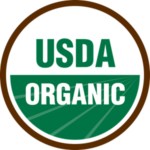Resources
We have compiled a list of resources to help you transition, produce, and sell your organic goods. Additionally, you can find information regarding organic farming in Indiana and the market that exists.
Contact Us
Ashley Adair
Extension Organic Agriculture Specialist
holmes9@purdue.edu
625 Agriculture Mall Dr.
West Lafayette, IN 47907
(765) 496-6362
What is Organic Agriculture?
 |
Organic is a labeling term for food or other agricultural products that have been produced using cultural, biological, and mechanical practices that support the cycling of on-farm resources, promote ecological balance, and conserve biodiversity in accordance with the USDA organic regulations. This means that organic operations must maintain or enhance soil and water quality, while also conserving wetlands, woodlands, and wildlife. Synthetic fertilizers, sewage sludge, irradiation, and genetic engineering may not be used. Only products that have been certified as meeting the USDA’s requirements for organic production and handling may carry the USDA Organic Seal (USDA National Organic Program, November 2016). |
The Organic Market
According to the Organic Trade Association, sales of organic products in the U.S. have grown from $3.6 billion in 1997 to over $47 billion in 2016. While organic food sales make up just over 5% of total U.S. food sales, less than 1% of farmland is dedicated to organic production. Domestically, supply of organic commodities is not keeping up with growing demand. Much of the domestic organic supply shortfall is being satisfied with imports. For example, according to the USDA ERS, over 75% of organic soybean consumption was satisfied with imports in 2016. Organic processors and handlers continue to run into supply shortfalls and are seeking more domestic supplies in order to reduce dependence on imports. This situation presents unique opportunities for Indiana farmers who are interested in diversifying into the organic sector and navigating the 3-year transition process.
Visit our resource pages on Transition & Certification, Production, and Markets to learn more about organic agriculture.
Organic in Indiana
The number of certified organic operations (certified to the USDA National Organic Program, 7 CFR 205) in Indiana has grown substantially in recent years. According to the 2017 Census of Agriculture, the number of certified organic farms increased from 271 in 2012 to 602 in 2017. The USDA Organic Integrity Database (as of May 2020) lists nearly 900 certified organic operations. This encompasses a diversity of crop (grain, forage, vegetables) and livestock (dairy, eggs, poultry, beef) farms, and handling (food processing, packaging, milling, etc) operations. Learn more about organic operations in Indiana by exploring the following interactive map of certified operations. The map was created in Google Maps with data downloaded from the USDA Organic Integrity Database (accessed May 30, 2020). Learn more about the organic agriculture sector in Indiana.
